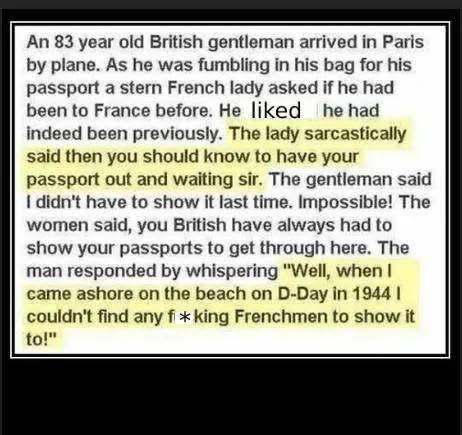
A Quiet Reminder from a Hero in Line
An 83-year-old British gentleman stepped off a plane at Charles de Gaulle Airport, moving with the graceful calm of someone who’d seen the world change more than once. As he made his way through customs, he reached into his worn travel bag, fingers searching for his passport.
Before he could produce it, a stern-faced French border agent approached. With the clipped tone of bureaucracy and not a flicker of a smile, she asked,
“Have you ever been to France before?”
The man gave a small nod, his voice steady and composed.
“Yes, I have.”
Unmoved, she replied sharply,
“Then you should already know to have your passport ready, sir.”
He looked up from his bag and met her gaze, replying with a quiet clarity:
“Well, the last time I came to France, I didn’t need to show it.”
She raised an eyebrow, clearly unimpressed.
“Impossible. The British have always needed a passport to enter France,” she insisted.
But the gentleman leaned in slightly, his voice soft but firm.
“That may be,” he said, “but when I came ashore on D-Day in 1944… there wasn’t a single Frenchman to show it to.”
The words landed like a thunderclap—simple, undeniable, and charged with the weight of history. Silence swept through the nearby crowd. In that moment, he wasn’t just another traveler—he was a living reminder of courage, sacrifice, and freedom.
At just 18 or 19 years old, this man had stormed the beaches of Normandy as part of the Allied invasion that turned the tide of World War II. He had faced gunfire, chaos, and death—not for glory, but for liberation. For peace. For France.
He hadn’t shared his story out of pride or to embarrass the officer. He shared it because it mattered. Because behind every elderly face is a lifetime of stories—and sometimes, even a slice of history that changed the world.
This gentleman’s humility made his words even more powerful. No boast. No lecture. Just a gentle reminder that freedom isn’t free—and sometimes, respect is the most powerful currency we can offer.
His presence echoed something deeper, too: the enduring significance of remembrance. In the UK and many Commonwealth countries, the red poppy symbolizes those who served and sacrificed. To some, it’s just a flower. To others, like this man, it’s a symbol of bloodshed, bravery, and the price of peace.
So next time you’re in an airport queue, a crowded café, or just going about your day, pause for a moment. Look around. That quiet gentleman with silver hair and a steady gaze? He might just be someone who helped shape the freedoms you now enjoy.
And if you ever wear a poppy—wear it not just with pride, but with understanding. For men like him. For all they gave. And for the stories they carry that the world should never forget.